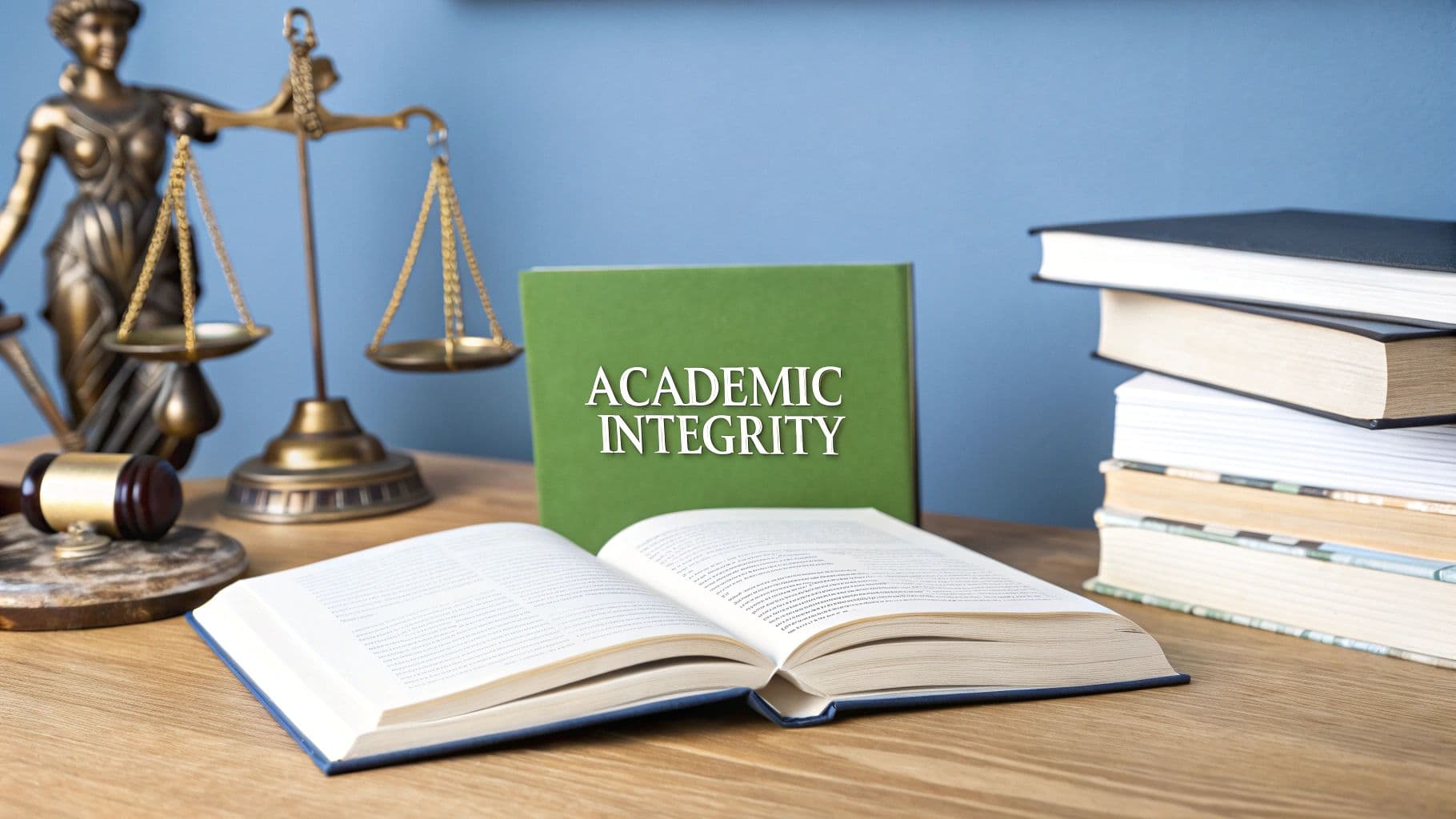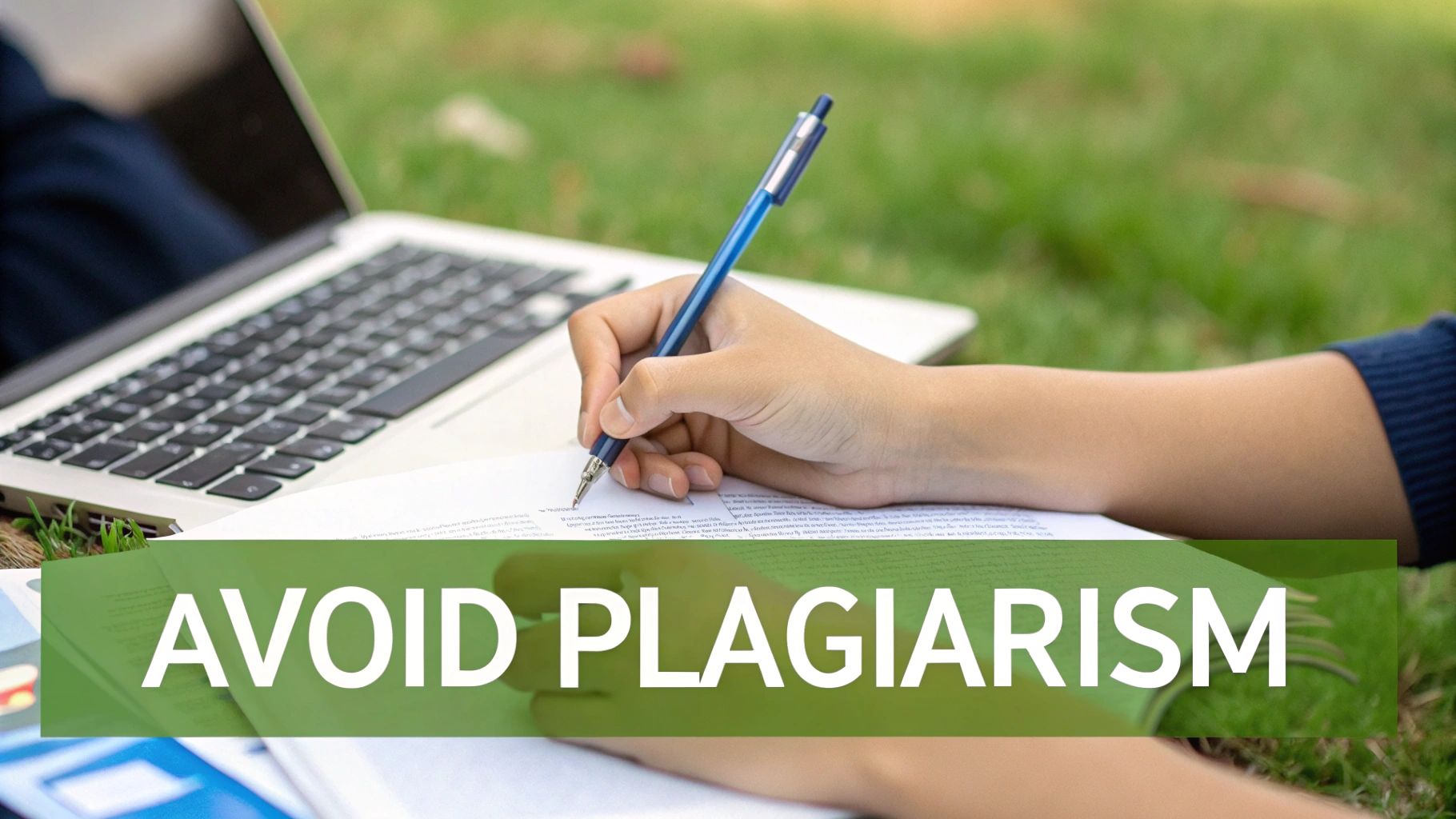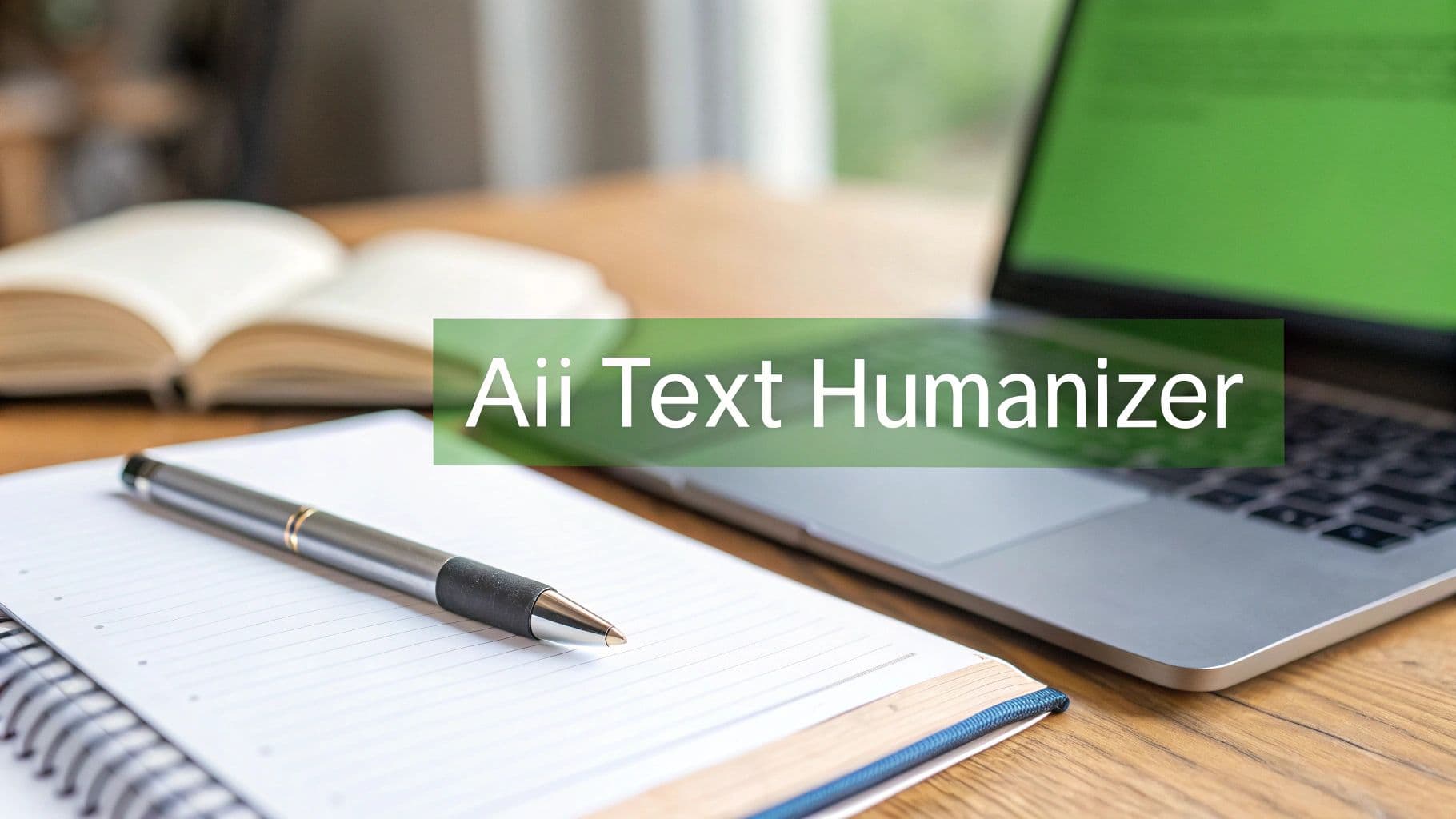
What Is Academic Integrity? Your Essential Guide
August 8, 2025
Academic integrity is so much more than a stuffy phrase you see in a syllabus. Think of it as the moral compass that gives your education—and eventually, your degree—its actual value. It's a promise to yourself, your peers, and your instructors to act with honesty, trust, fairness, respect, and responsibility in everything you do.
What Is Academic Integrity, Really?
It’s easy to think of academic integrity as a long list of "don'ts," but that misses the point entirely. A better way to see it is as the unspoken agreement that holds the entire learning community together. It’s the shared understanding that makes intellectual curiosity thrive, ensures hard work gets rewarded, and gives every diploma its credibility.
When that agreement is honored, everyone wins.

As you can see, this isn't a solo mission. It's a shared commitment where students and institutions work together. The problem? The pressure to get ahead sometimes pushes students to take shortcuts, and that’s where things get complicated.
The Five Pillars of Academic Integrity
To truly get a handle on this, it helps to break academic integrity down into its five core values. These aren't abstract concepts; they are the practical principles that will guide you through your academic career.
The table below breaks down these five pillars and what they mean for you on a daily basis.
| Pillar | What It Means for You |
|---|---|
| Honesty | Being truthful about your work. You submit your own ideas and give credit where credit is due when you use someone else's. |
| Trust | Creating a reliable environment where your instructors believe your work is genuinely yours, and you can trust the system is fair. |
| Fairness | Making sure everyone plays by the same rules. No one should get an unfair advantage, and everyone is graded on the same standards. |
| Respect | Valuing the ideas of others, even when you disagree. It means engaging in thoughtful debate and always acknowledging the contributions of other scholars. |
| Responsibility | Owning your education. This means asking for help when you need it and making sure you understand the rules. For a deeper dive, our comprehensive academic integrity guidelines are a great resource. |
When you live by these values, you're doing more than just staying out of trouble. You're building a foundation of ethics and accountability that will define your professional life long after you graduate.
It's a serious issue. Shockingly, some studies have found that up to 95% of students admit to cheating in some form, and a staggering 85% believe that things like plagiarism could actually help them earn better grades.
This isn’t just about avoiding penalties. It's about becoming the kind of person who contributes to a culture of trust and builds a reputation for integrity—something that will serve you for a lifetime.
Why Your Integrity Shapes Your Future Success
It’s easy to think of what is academic integrity as something that only matters for passing a class. But that view misses the bigger picture entirely. The habits you form now, in your academic life, don’t just vanish after graduation—they become the bedrock of your professional identity and set you up for success down the road. This is about so much more than a grade on a transcript.
Every time you choose to do your own work, you're doing something important. You're building irreplaceable skills. Instead of hunting for a shortcut, you’re forced to think critically, break down complex information, and create your own original arguments. Think of it as a mental workout. It’s how you build real intellectual muscle.
From Classroom Habits to Career Strengths
The line between your conduct in the classroom and your performance in the future is a straight one. Employers aren’t just hiring people who can spit back facts and figures; they’re looking for people who have a proven ability to solve problems and think ethically. A real commitment to integrity is a huge indicator of character.
Put it this way: a degree from a good school tells an employer you’ve met a certain standard of learning. But the integrity behind that degree? That tells them what kind of person you’ll be to work with. It shows a future boss that you’re trustworthy, responsible, and can be counted on to produce authentic work—qualities that are worth far more than a perfect GPA.
Your degree gets you in the door. Your integrity builds your career. It’s the reputation you earn for being honest, fair, and accountable that creates opportunities no qualification alone ever could.
Building a Reputation That Lasts
Your reputation—both personal and professional—starts right now. Every single project you complete with honesty adds another block to that foundation. That reputation for being dependable will follow you, shaping how colleagues, clients, and managers see you for years to come.
Here’s how upholding integrity now pays off in a big way later:
- You Become a Better Problem-Solver: When you wrestle with tough concepts yourself, you learn how to work through challenges without reaching for an easy out. That’s a crucial skill in any job.
- You Build a Stronger Ethical Compass: Making the right choices consistently in a low-stakes academic setting is like training. It prepares you to handle the high-stakes ethical dilemmas that inevitably show up in the professional world.
- Your Confidence Grows: There's a deep, genuine sense of accomplishment that comes from knowing you earned your success on your own merit. That kind of self-assurance is something you can't fake in a job interview or in the workplace.
Ultimately, practicing academic integrity is an investment in your future self. It’s what ensures the degree you’re working so hard for is more than just a piece of paper. It becomes a true reflection of your knowledge, your character, and your ability to do great work.
Common Violations and How to Avoid Them
 To really get a handle on academic integrity, you first need to know where students most often trip up. These violations aren't always grand schemes of deceit; a lot of them happen in the gray areas where the rules feel a bit blurry. The key is knowing what these common missteps are so you can steer clear of them.
To really get a handle on academic integrity, you first need to know where students most often trip up. These violations aren't always grand schemes of deceit; a lot of them happen in the gray areas where the rules feel a bit blurry. The key is knowing what these common missteps are so you can steer clear of them.
The most famous violation is, of course, plagiarism—passing off someone else's ideas or words as your own without giving them credit. This goes way beyond simple copy-and-paste jobs. It can be sloppy paraphrasing, a forgotten citation, or a misunderstanding of understanding intellectual property in education.
At its heart, every single academic violation comes down to a breach of trust. Whether it's plagiarism, collusion, or faking data, you're breaking the core agreement that your work is a genuine reflection of your own effort and learning.
Plagiarism in All Its Forms
Beyond the obvious copy-paste, plagiarism has some sneakier forms you need to watch out for. Accidental plagiarism is a big one. It usually happens from messy note-taking or rushing to hit a deadline, and suddenly you can't remember if an idea was yours or something you read.
Then there’s self-plagiarism. This is when you reuse your own work from a previous class without getting the green light from your current instructor. Every assignment is supposed to be a new learning experience, and recycling old work misses that point entirely. If you want a deeper dive into these nuances, our guide on how to avoid plagiarism is a great resource.
Collaboration vs Collusion
Let’s be clear: group projects and study sessions are a fantastic part of education. But there’s a razor-thin line between healthy teamwork and what’s known as collusion.
- Collaboration (Good): This is when you and your peers talk through concepts, brainstorm ideas, or give each other feedback. You’re all working together to help each other grasp the material.
- Collusion (Bad): This is when you work together on an assignment that was explicitly designed to be done alone. Things like sharing answers on a test, splitting up the work on an individual project, or co-writing a paper that wasn't assigned as a group effort all fall under this category.
When in doubt, always ask your instructor. It’s on you to get clarification if the boundaries aren't crystal clear.
Contract Cheating and Data Issues
Some violations are far more serious. Contract cheating is one of the worst—it’s when you pay someone else, like an online essay mill or even a tutor, to do your work for you. It’s a direct and severe act of dishonesty.
In the same vein, data falsification or fabrication is a major offense, especially in research. This means you're inventing data, tweaking results to fit your hypothesis, or conveniently leaving out information that contradicts your claims. These aren't just student-level problems; they have a ripple effect that can impact entire institutions. The new Research Integrity Risk Index (RI²) even shows that some universities have a ‘moderately elevated risk and emerging concern’ for these kinds of breaches, which just goes to show that upholding these standards is everyone's job.
Navigating Academic Honesty in the Age of AI
The rise of powerful AI tools has thrown a new, complicated wrinkle into the old conversation about what is academic integrity. Let's be honest: these technologies can be incredible learning assistants. But they also create a very fine line between using a tool for help and committing an academic offense. For today's student, figuring out where that line is has become a critical skill.
Think of AI like a really good calculator. It’s a brilliant tool for checking your math, running complex calculations you can't do in your head, or even exploring different ways to solve a problem. But if a test asks you to show your work, you wouldn't just write down the calculator's final answer, right? The same logic applies here.
Using AI to brainstorm ideas, sketch out an essay outline, or polish your grammar is usually fine—and often very helpful. The trouble starts the moment you copy and paste AI-generated text and pass it off as your own original thought. That's when you cross the line into serious academic misconduct. It's really the modern version of contract cheating, because you're submitting work someone—or something—else did for you.
The New Rules of Engagement
Universities are moving fast to update their policies, but at the end of the day, the responsibility to use these tools ethically is on you. The question you always have to ask yourself is simple: "Is this my work?" If an AI wrote the sentences, built the core arguments, or structured entire paragraphs for you, the answer is no.
To help you stay on the right side of that line, here are a few practical guidelines:
- Brainstorming Partner: Use AI as a sounding board. Ask it questions, get it to generate a list of initial ideas, or use it to see a topic from a different angle. It’s a great way to get the wheels turning.
- Outline Assistant: You can ask an AI to help structure your paper. Just make sure you're the one who fills in that structure with your own research, your own analysis, and your own words.
- Grammar Guru: Using AI to check for spelling mistakes, awkward phrasing, or grammar errors is a perfectly ethical use of the technology. Think of it as a supercharged spell-checker.
Making this distinction is everything. It's also smart to understand how these systems work and how they're being used in the real world, even in education itself. For instance, seeing how professionals are using ChatGPT to create courses can give you a better feel for both the capabilities and the ethical boundaries of these tools.
A Shifting Enforcement Landscape
Institutions aren't just sitting back and watching this happen. Globally, about 68% of teachers now report using AI tools to help identify academic dishonesty, which shows a growing reliance on tech to uphold standards. And here’s an interesting stat from the United Kingdom: while only about 10% of academic content is flagged as AI-generated, the overall plagiarism rate is a staggering 33%. This proves that integrity challenges have always been there, long before AI came along.
The rise of AI doesn't change the fundamental definition of academic integrity; it just raises the stakes. The goal remains the same: to produce honest, original work that reflects your own learning and critical thought.
Ultimately, AI is a powerful resource, but it can't replace your voice, your analysis, or your unique perspective. If you use it responsibly—as a support tool, not a ghostwriter—you can get all the benefits without compromising the very integrity that gives your education its real value.
Practical Strategies for Upholding Your Integrity

Knowing what academic dishonesty is gets you halfway there. But the real goal is to build habits that make integrity your default setting, even when the pressure is on.
Think of it as your game plan for succeeding honestly. Instead of just dodging the things you're not supposed to do, these strategies help you create work you're truly proud of. When you feel confident in your process, the temptation to cut corners starts to fade.
It's a lot like building a house. You don't just avoid using shoddy materials; you have to actively choose strong ones and put them together the right way. Your academic work is no different.
Manage Your Time to Reduce Pressure
Let’s be honest: a huge number of academic integrity violations aren't born from a deep desire to cheat. They come from pure, last-minute panic. When the deadline is looming and you feel completely swamped, your judgment can get a little fuzzy.
That’s why mastering time management is your single best defense.
Good planning pulls you out of the chaos. When you break down a huge assignment into smaller, manageable steps, you completely sidestep the all-nighter desperation that leads to bad decisions.
Start with a planner or a digital calendar and map out every due date for the entire semester. Then, work backward. Set your own mini-deadlines for research, outlining, drafting, and editing. Suddenly, that terrifying 20-page paper becomes a series of simple, achievable tasks.
For an extra layer of support, try working with a study accountability partner. Knowing someone will be checking in can be just the push you need to stay on track and make honest choices when you feel the pressure mounting.
Become a Master of Citation
Giving credit where it’s due is non-negotiable. Proper citation isn't just a technicality to avoid a plagiarism accusation; it’s how you show respect for the scholars whose work you're building on. It's what gives your own arguments weight and credibility.
Don't save this for the end. Weave it into your workflow with a few simple habits:
- Cite As You Go: The second you pull a quote, a stat, or a key idea from a source, drop the citation right into your document. This completely eliminates the "Where did I get this from?" headache later on.
- Understand the Style: Know whether your professor wants APA, MLA, Chicago, or something else. Each one has its own specific rules, and using the wrong one can make your work look sloppy, even if your intentions were good.
- Use Citation Tools Wisely: Tools like Zotero or Mendeley are fantastic for organizing sources, but they aren't foolproof. Always, always double-check what they generate to make sure it's accurate.
Taking ownership of your citation process is a core component of what is academic integrity. It demonstrates responsibility and shows you are an active participant in the academic conversation.
Know When and How to Ask for Help
Finally, one of the most powerful things you can do is realize you don't have to figure it all out alone. Your instructors, TAs, and campus writing centers are literally there to help you succeed.
Asking for help isn't a sign of weakness—it's a sign of strength and self-awareness.
If you’re stuck on a tough concept, schedule time during your professor’s office hours. If your writing feels clumsy or disorganized, take it to the writing center. These resources exist for you.
And if you want more tips on polishing your work, our guide to better academic writing is full of practical advice. Turning a challenge into a chance to learn is the ultimate power move. It's integrity in action.
Of course. Here is the rewritten section, crafted to sound human-written and match the provided style examples.
Your Academic Integrity Questions Answered
Even with the best of intentions, academic work can throw you a curveball. You run into these gray areas where the right thing to do isn't immediately obvious. Having clear answers to common questions about what is academic integrity helps you navigate those tricky situations with confidence.
Let's clear up the confusion that trips up so many students, from collaborating with friends to reusing your own work. The goal here is to give you that clarity so you can focus on producing honest work you're proud of, without the stress of second-guessing yourself.
Collaboration vs. Collusion: What Is the Difference?
This is probably one of the biggest points of confusion, and for good reason. The line between working together productively and actually cheating can feel incredibly thin, but it's a critical distinction to understand.
Collaboration is all about teamwork for the sake of learning. Think of it as forming a study group, brainstorming ideas for a project, or giving a friend feedback on their draft. You're supporting each other's understanding.
Collusion is when that teamwork crosses the line. It's working together on something that was meant to be done alone. This could be anything from sharing answers on a test to splitting up the work on an individual assignment.
When in doubt, just ask. Seriously. A quick email to your instructor is the safest and most responsible way to make sure you're on the right track.
Can I Reuse a Paper I Wrote for a Previous Class?
It’s a fair question, but the answer is almost always no—unless you get explicit, upfront permission from your current instructor. Using your old work for a new class is considered self-plagiarism.
Think of it this way: each course is a fresh learning experience, and every assignment is your chance to show what you've learned in that class. Handing in an old paper completely sidesteps that purpose. The best rule of thumb is to assume every assignment needs to be started from scratch.
"There are nuances to these situations that we need to be empathetic towards as educators; we don’t want to discourage students from supporting their peers or unfairly condemn them. But at the same time we need to arm students with the tools to navigate these situations and the understanding that they are responsible for upholding university values."
Can I Still Commit Plagiarism If I Cite All My Sources?
Yes, you absolutely can. Proper citation is essential, but it isn't a get-out-of-jail-free card for plagiarism. If your paper is just a collection of quotes or slightly rephrased sentences strung together, it doesn't matter if you've cited everything perfectly.
Your work needs to be built on your own original thoughts and analysis. A paper that’s just a patchwork of other people's ideas—even with citations—is missing the most important ingredient: you.
What Should I Do If I Suspect a Classmate Is Cheating?
This is a tough one. Seeing someone else cheat is awkward and uncomfortable, and you might feel worried about getting involved or what others will think.
Your best first step is to check your university's academic integrity policy. Most schools have clear, confidential procedures for this exact situation. You can typically report your concerns directly to the professor, the department head, or a dedicated academic integrity office. This puts the issue in the hands of professionals and keeps you out of the middle of it.
When you've done the hard work, you want your writing to shine. Natural Write helps you transform your drafts from good to great by refining clarity and tone while ensuring your original voice remains. Polish your essays and assignments with confidence by using our free tool to make your writing more natural and readable.


